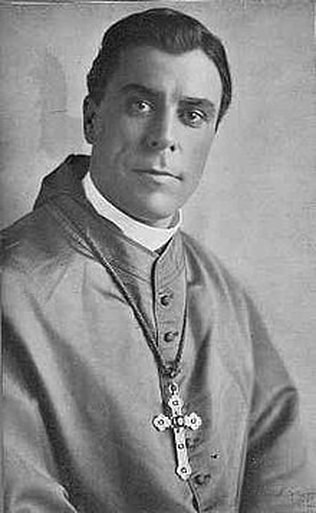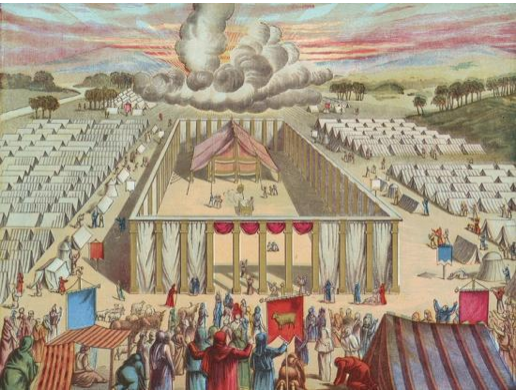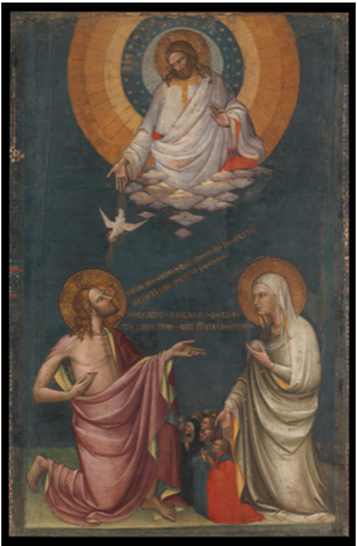A Review of "The Collected Works of
Bishop J. I. Wedgwood" by the Revd Giovanni Pede
No one may has a monopoly on the Sacraments.
Wedgwood's book has great merit: it describes spiritual and theological topics without confusing the reader and wasting ink in useless arguments that lead nowhere. This avoids leaving the reader with questions such as "But, so what? What are they getting at? Why do they waste so much time discussing something that so transcends the limits of man and that does not need speculation to be understood but rather experienced?".
An example on how Bishop Wedgwood deals with not very productive debates extant in the world of the churches, can be found in the section of the book where he talks about the different ways in which the churches understand the Eucharist and the Real Presence. In my opinion he does this in a masterly way, in a way corroborating all views. Christ is always present, in the universe, in the world, in man, so the presence is always verified and verifiable. However, only those Churches that have maintained valid apostolic succession and a proper form of the rite can make His presence more effectively and tangibly concentrated so that it becomes an element of spiritual evolution for the celebrant, the assembly and the surroundings of the place where the Eucharist is celebrated. Moreover, the rite is always effective ex opere operato. And this applies to all sacraments. In churches that do not maintain apostolic succession, the efficacy of the sacraments falls into the category of rites efficacious ex opere operantis. It is quite comical to think that this principle “ex opere operantis” applies to churches that usually deny the role of individual works in God’s project of salvation (sola fide, sola gratia).. as it seems that the effectiveness of their ceremonies (or rites) depends on the individual dispositions, devotion, temperament of the celebrant. How can one say that individual work does not have any role here?
The chapter on Holy Orders is also particularly interesting. Wedgwood compares ordination within the Liberal Catholic Church to the ordinations given in the Roman Catholic Church, stating that the only element that is lost (in the case of the LCC) is that of jurisdiction. By necessity a priest ordained in the LCC cannot have any jurisdiction in the Roman Church. However, he is a priest in the same way as his Roman counterparts, the sacrament imparts character and grace is not withheld, but is bestowed in the same way through the imposition of the bishop's hands. Even the question of oikonomia within the Orthodox churches seems to be a confirmation of the validity of LCC ordinations: if clergy ordained in non-Orthodox churches (so this is true also for Roman Catholics..) apply to be incardinated, there will not be any re-ordination but only zje celebration of a ceremony of entrance. Orthodox churches claim this ceremony would 'release' the grace that was withheld during the first ordination and give them jurisdiction in the church. This is an exclusive approach and even a little arrogant. It is like saying: “we are the only real church, we alone have the power to control God’s grace”. No church may claim having a switch with an ON/OFF button to release grace.
Churches that believe themselves to be the only authentic and true holders of grace in my view contravene the instructions of Christ, who empowers those outside the inner circle of disciples to act in His name. In Mark 9, 38-41 Jesus tells the disciples not to forbid those who cast out demons in his name to do so: "there is no man who shall do a miracle in my name, that can lightly speak evil of me. For he that is not against us is on our side". Something similar happened to Moses. When he selected seventy elders to assist him in his ministry, on the day of their consecration, two of them decided not to go to the Tent of Meeting for the consecration and remained in the camp. The Spirit of God rested on those present in the tent, but also reached the two elders that stayed outside that started prophesying. Joshua, son of Nun, asked Moses to stop them. Moses answered: “Are you jealous for my sake? I wish that all the Lord’s people were prophets and that the Lord would put his Spirit on them!” (Nm 11, 26-30). What can we learn from this? The Spirit blows where it will (John 3, 8), not where any church minister commands.
Additionally, it is Christ the High Priest who performs the sacraments, no church should arrogate to itself the right to be the sole representative of Christ on earth. All churches are part of God's plan and work for the building of the Kingdom. In the perfect world, the relationship should be one of collaboration and never one of conflict and obstruction. But man is not perfect, and less so are agglomerations of humans.
Wedgwood's book has great merit: it describes spiritual and theological topics without confusing the reader and wasting ink in useless arguments that lead nowhere. This avoids leaving the reader with questions such as "But, so what? What are they getting at? Why do they waste so much time discussing something that so transcends the limits of man and that does not need speculation to be understood but rather experienced?".
An example on how Bishop Wedgwood deals with not very productive debates extant in the world of the churches, can be found in the section of the book where he talks about the different ways in which the churches understand the Eucharist and the Real Presence. In my opinion he does this in a masterly way, in a way corroborating all views. Christ is always present, in the universe, in the world, in man, so the presence is always verified and verifiable. However, only those Churches that have maintained valid apostolic succession and a proper form of the rite can make His presence more effectively and tangibly concentrated so that it becomes an element of spiritual evolution for the celebrant, the assembly and the surroundings of the place where the Eucharist is celebrated. Moreover, the rite is always effective ex opere operato. And this applies to all sacraments. In churches that do not maintain apostolic succession, the efficacy of the sacraments falls into the category of rites efficacious ex opere operantis. It is quite comical to think that this principle “ex opere operantis” applies to churches that usually deny the role of individual works in God’s project of salvation (sola fide, sola gratia).. as it seems that the effectiveness of their ceremonies (or rites) depends on the individual dispositions, devotion, temperament of the celebrant. How can one say that individual work does not have any role here?
The chapter on Holy Orders is also particularly interesting. Wedgwood compares ordination within the Liberal Catholic Church to the ordinations given in the Roman Catholic Church, stating that the only element that is lost (in the case of the LCC) is that of jurisdiction. By necessity a priest ordained in the LCC cannot have any jurisdiction in the Roman Church. However, he is a priest in the same way as his Roman counterparts, the sacrament imparts character and grace is not withheld, but is bestowed in the same way through the imposition of the bishop's hands. Even the question of oikonomia within the Orthodox churches seems to be a confirmation of the validity of LCC ordinations: if clergy ordained in non-Orthodox churches (so this is true also for Roman Catholics..) apply to be incardinated, there will not be any re-ordination but only zje celebration of a ceremony of entrance. Orthodox churches claim this ceremony would 'release' the grace that was withheld during the first ordination and give them jurisdiction in the church. This is an exclusive approach and even a little arrogant. It is like saying: “we are the only real church, we alone have the power to control God’s grace”. No church may claim having a switch with an ON/OFF button to release grace.
Churches that believe themselves to be the only authentic and true holders of grace in my view contravene the instructions of Christ, who empowers those outside the inner circle of disciples to act in His name. In Mark 9, 38-41 Jesus tells the disciples not to forbid those who cast out demons in his name to do so: "there is no man who shall do a miracle in my name, that can lightly speak evil of me. For he that is not against us is on our side". Something similar happened to Moses. When he selected seventy elders to assist him in his ministry, on the day of their consecration, two of them decided not to go to the Tent of Meeting for the consecration and remained in the camp. The Spirit of God rested on those present in the tent, but also reached the two elders that stayed outside that started prophesying. Joshua, son of Nun, asked Moses to stop them. Moses answered: “Are you jealous for my sake? I wish that all the Lord’s people were prophets and that the Lord would put his Spirit on them!” (Nm 11, 26-30). What can we learn from this? The Spirit blows where it will (John 3, 8), not where any church minister commands.
Additionally, it is Christ the High Priest who performs the sacraments, no church should arrogate to itself the right to be the sole representative of Christ on earth. All churches are part of God's plan and work for the building of the Kingdom. In the perfect world, the relationship should be one of collaboration and never one of conflict and obstruction. But man is not perfect, and less so are agglomerations of humans.
Is it right to venerate the Virgin Mary?
Mary is one of the mysteries of Christianity, so to relegate her to a simple model to follow is limiting. There is much more to the historical and biblical story of Mary and there is nothing wrong with the Marian cult. Popular faith can be genuine and effective, even more so than the faith of those who have just memorised doctrines or for whom faith is just a matter of erudition. Besides, the Lord looks at intention and devotion. To the sick woman who touched his cloak, Jesus, healing her, said: "Go, your faith has saved you" (Mt 9, 20-22; Mr 5, 25-34; Lk 8, 43-48). The woman does not turn to Jesus directly (she thought maybe that it was the cloak that had the power to heal her) , but nevertheless Jesus accepts the woman's genuine act of request. Even in the extreme cases where the worship of Mary takes the place of the worship of Our Lord, why should the Lord ignore a prayer just because it is addressed to Mary rather than to Him directly?
As Wedgewood says, Mary receives the love and devotion of her adherents as a channel through which it passes to Christ and through Her passes the Love of Christ in that it comes in response to prayers.
Mary is one of the mysteries of Christianity, so to relegate her to a simple model to follow is limiting. There is much more to the historical and biblical story of Mary and there is nothing wrong with the Marian cult. Popular faith can be genuine and effective, even more so than the faith of those who have just memorised doctrines or for whom faith is just a matter of erudition. Besides, the Lord looks at intention and devotion. To the sick woman who touched his cloak, Jesus, healing her, said: "Go, your faith has saved you" (Mt 9, 20-22; Mr 5, 25-34; Lk 8, 43-48). The woman does not turn to Jesus directly (she thought maybe that it was the cloak that had the power to heal her) , but nevertheless Jesus accepts the woman's genuine act of request. Even in the extreme cases where the worship of Mary takes the place of the worship of Our Lord, why should the Lord ignore a prayer just because it is addressed to Mary rather than to Him directly?
As Wedgewood says, Mary receives the love and devotion of her adherents as a channel through which it passes to Christ and through Her passes the Love of Christ in that it comes in response to prayers.
Salvation and Liberation. Same thing?
Wedgwood says that salvation has more to do with good health, it keeps us away from falling into “involution”. Liberation is something that goes beyond, it can be experienced to varying degrees. There are many small liberations, in addition to the supreme liberation pursued somewhat by all who are on a spiritual path. To paraphrase, perhaps the salvation offered to us is what guarantees our process of evolution. It is a continuous process of refinement in this life and the next. In liberation we reach the true end of religion(s), we are brought back to our true home in God. And there will be no more evolution but union.
Wedgwood says that salvation has more to do with good health, it keeps us away from falling into “involution”. Liberation is something that goes beyond, it can be experienced to varying degrees. There are many small liberations, in addition to the supreme liberation pursued somewhat by all who are on a spiritual path. To paraphrase, perhaps the salvation offered to us is what guarantees our process of evolution. It is a continuous process of refinement in this life and the next. In liberation we reach the true end of religion(s), we are brought back to our true home in God. And there will be no more evolution but union.



 RSS Feed
RSS Feed
